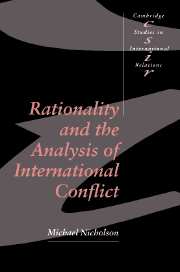Book contents
- Frontmatter
- Contents
- Preface
- Introduction: Rationality and the analysis of conflict
- PART I CONFLICT
- PART II RATIONAL BEHAVIOUR
- 3 RATIONALITY AND CONFLICT
- 4 CONFLICT AND THE PARADOXES OF RATIONALITY
- 5 THE ZERO-SUM GAME: SOLUTIONS AND INTERPRETATIONS
- 6 EMOTION AND RATIONALITY
- 7 INTERNATIONAL CRISES: THE WARPING OF RATIONALITY
- RATIONAL BEHAVIOUR AND RATIONAL CHOICE: AN ASSESSMENT
- PART III RATIONAL BELIEF: SOME TOPICS IN CONFLICT ANALYSIS
- PART IV CONCLUSION
- References
- Index
- Titles in the series
RATIONAL BEHAVIOUR AND RATIONAL CHOICE: AN ASSESSMENT
Published online by Cambridge University Press: 24 November 2009
- Frontmatter
- Contents
- Preface
- Introduction: Rationality and the analysis of conflict
- PART I CONFLICT
- PART II RATIONAL BEHAVIOUR
- 3 RATIONALITY AND CONFLICT
- 4 CONFLICT AND THE PARADOXES OF RATIONALITY
- 5 THE ZERO-SUM GAME: SOLUTIONS AND INTERPRETATIONS
- 6 EMOTION AND RATIONALITY
- 7 INTERNATIONAL CRISES: THE WARPING OF RATIONALITY
- RATIONAL BEHAVIOUR AND RATIONAL CHOICE: AN ASSESSMENT
- PART III RATIONAL BELIEF: SOME TOPICS IN CONFLICT ANALYSIS
- PART IV CONCLUSION
- References
- Index
- Titles in the series
Summary
In the previous chapters I have analysed the concept of decision and in particular rational decision and applied it to some problems of conflict in the international system. I shall now give a brief assessment of its usefulness in the analysis of such problems.
The simple concept of rationality applies quite well in some conflict problems, such as those which can be modelled in terms of a zero-sum game, and indeed in many non-zero-sum games, though I have not shown that here. It provides ‘solutions’ in the sense of demonstrating how players, defined in some sense as rational, will play the game – or at least ought to play the game if they are governed by the motives we attribute to them. A solution exists if the best strategy player A can play against a particular strategy of player B is such that player B cannot gain anything by changing strategy. The significance of the solutions are that they are a key to the rational playing of a game. If a solution exists, then each rational player should act so as to achieve that solution. If there are no solutions, then it is much less clear what rational play consists of. The formulation of such solutions is impressive, as noted in the chapter on zero-sum games, and is a triumph of the theory of games.
- Type
- Chapter
- Information
- Rationality and the Analysis of International Conflict , pp. 138 - 142Publisher: Cambridge University PressPrint publication year: 1992

